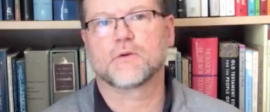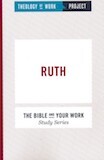Redemption - the Peculiar Calling of Jesus’ Followers (Sermon Notes)
Sermon Notes / Produced by partner of TOW
This is the tenth sermon in the series: “Inspired: The Whole of Life with God in the Picture.” It was delivered by Will Messenger, Executive Editor of the Theology of Work Project, at Reservoir Church Cambridge Massachusetts on November 15, 2015. This content is part of the Ruth and Parables curriculum, an 11-week integrated sermon and small group series on faith and work.
Last week our pastor Steve Watson talked about what it means to be redeemed from a bad situation at work or in life generally, like what happens to Ruth in the book of Ruth. This week I’m going to talk about the other side of the same coin—what it means to be a redeemer for someone else who’s in a bad situation, like what Boaz does in the book of Ruth. But to begin with, I actually have to start by taking Ruth’s perspective myself. Because I know what it means to need to be redeemed at work, to really mess up on the job and need someone to cut me a break and help me recover from my mistake.
The summer between my years of business school, I got a job with an investment bank called Goldman Sachs, in New York. This is a plum summer job for a business school student. It’s very prestigious. People who get permanent jobs investment banks after graduating make a ton of money. And a summer job is almost guaranteed to get you a permanent offer after you graduate, unless you totally screw up. I didn’t come from a family or an undergraduate college where you even imagined you could get this kind of job. So for me this summer job was a big deal.
I got assigned a team defending a Midwestern department store chain against a takeover attempt by a hedge fund. It’s kind of a complicated transaction, but my assignment was simple. The same hedge fund had tried to take over another company about two years previously. My manager told me to go through the Wall Street Journal archives and write up a “concise” history of that previous attempt. If we could see what happened the last time around, maybe it could help us figure out what would work this time.
I went to the archives and pulled up every article in the Wall Street Journal from the previous attempt. I spent all day reading them, following the events of the action, putting together the pieces. Focusing on the word “concise” I tried to give the big picture of the story without bogging down in the details. I made a compelling narrative with a beginning, middle and end.
However, maybe I was too concise. I turned the report over to my manager at the end of the day, and when I came in the next day he was furious. “Your report was totally useless,” he said. “You missed almost everything important that happened. You got it all jumbled up. I had to stay here till midnight re-writing it. Did you even do the research I told you to do? You’re hopeless.”
“Oh,” I said. “I misunderstood what you wanted. I’m really sorry. I’ll go back and write a step-by-step account.”
“No,” he said. “I’ve already done that. Just go back to the team room and stay out of the way.”
I got shuffled off the team a few days later. This is when I knew I needed a redeemer. Someone who wouldn’t see me only as damaged goods. Someone who could see that I actually was a competent, diligent worker who needed a second chance. Fortunately I got assigned to a new team right away. I did a great job on this assignment, which was negotiating the sale of $50 million of stock to investors in New York, Boston, Chicago and Los Angeles. (This was back when $50 million was a lot of money J.) After we finished the negotiations in Chicago, Jerry, the senior partner said, you’re ready to do this on your own. I’ve another deal back in New York. You take the CEO of the company on to Los Angeles and run the negotiations there. Everything worked out great in Los Angeles, we got the deal done for a big profit, and the CEO of the client company called Jerry and raved about what a good job I’d done.
When I got the call from Goldman Sachs in October, I figured it would be my full-time job offer, my ticket to living large. But it wasn’t. It was a courtesy call telling me that I would not be receiving an offer, but thanks for my service, and best wishes in my job search. I was stunned.
So I immediately called Jerry and said, “I can’t believe I didn’t get a job offer. I thought I did a great job for you. Can you get this reversed?” You did do a great job for me, Will. I voted in favor of hiring you. But Ben said you did a terrible job for him, and he vetoed you.” “Jerry,” I said, “I know I screwed up on Ben’s project, but I learned from my mistake, and I saved your bacon that day you committed to be both in New York and LA at the same time. I thought you’d really fight for me.” “That’s not the way it works,” Jerry said. One veto, and you don’t get an offer. There’s nothing more I can do. Sorry.”
I needed a redeemer. I didn’t get one. Let me be clear. I got exactly what I deserved. But a redeemer doesn’t help you get what you ought to be able to get on your own. A redeemer helps you get what is beyond your limited reach. There was no redeemer for me at the end of my summer job at Goldman Sachs. And that my friends, is why I’m with you here today in Cambridge instead of waiting for my chauffeur to bring the car around and pick me up at the front door of my mansion in the Hamptons.
Based on my sad story, I’d say that every workplace needs a redeemer, but not many have them. What if followers of Jesus could be redeemers in their workplaces? What if Ben had been a redeemer? Maybe he would have said to me, “That was a huge screw-up, and you’ve got to prove to me that you’re not just coasting through this job like a summer vacation, but I’ll give you another chance?” Or what if someone else in my team had said, “You are in big trouble, but I’ll ask Ben if he’ll let me coach you and see if we can get you back on board.” Or what if Jerry had said, “OK, I’ll go see if I can persuade Ben to reconsider, but you’re going to have to come down here and meet with apologize to him personally first.” What would it be like if every workplace had a redeemer or two to help people get back on track after really messing up?
Let’s get into the book Ruth as a way to explore these questions. We’ve been reading this book together over the past 10 weeks. At this stage in the book a landowner named Boaz has been helping a young woman named Ruth and her mother-in-law Naomi be redeemed from destitution and exclusion in the land of Israel. They’re destitute because as widows, neither of them can own land, and their only skill seems to be agriculture. They’re excluded because Ruth is from the land of Moab, and Moabites are considered national enemies of Israel.
But Boaz keeps going out of his way to help Ruth and Naomi turn things around. He even welcomes Ruth’s bold advances towards marriage. That is to say, Boaz is whole-heatedly into serving as a redeemer for Ruth in a bad situation. Why does Boaz have a heart for Ruth?
It started long before he had any romantic interest in her. Way back in chapter 2, when Ruth first met Boaz, she said to him, “Why have I found favor in your sight, that you should take notice of me, when I am a foreigner?” —Ruth 2:10. She’s aware that people see her primarily as someone to be avoided.
But Boaz sees the good in Ruth going all the way back in her life. He replies, “All that you have done for your mother in-law since the death of your husband has been fully told to me.” —Ruth 2:11. All along, he’s been noticing the good in her, even when no one else seems to.
This brings us to fill-in #1 in your handout. The world, and all the people in it, start off good.
Boaz notices the good in Ruth. That, in a nutshell, is the beginning of the whole Bible. When the Bible begins, everything, and everybody, is good. The garden of Eden. If you want to be a redeemer for people, you have see the good in them, no matter how deeply buried. Ultimately everyone’s roots are planted in the good soil of the garden of Eden, and you have to train your eyes to see that far back. This is not a matter of putting on Pollyanna glasses and ignoring the bad things in people. It’s a matter of seeing deeper, with God’s sight, to the good roots. “The earth is the Lord’s, and everything in it. The world and all its people belong to him.” —Psalm 24:1. God created everyone in the world, and he created every one of us good.
Let’s apply this to your workplace, the place where you do your daily work, paid or unpaid, at home or school or somewhere else. What do you see good about your workplace or the people in it, especially the goodness that might be hidden? Jot it down in the box beside #1. To go back to Goldman Sachs, I can see that despite all the temptations for money and status, the culture there was dedicated to doing what’s best for the client. Time and again, I saw them put their clients’ interests ahead of their own, and they did everything to be trustworthy to their clients. So I could write down “serves clients’ interest” in this box. OK jot down a word or two even if you don’t have time to write it down in full.
Item number 2 is “The world breaks every one.” This is quote from Ernest Hemingway’s book A Farewell to Arms. Steve used it last week when he was talking about what it’s like to be someone in need of redemption, like Ruth. It fits perfectly here. I hardly have to tell you that things in the world are broken. We don’t live in the garden of Eden. Go ahead and jot down in item two, some ways your workplace or the people in it are messed up.
In my Goldman Sachs story, I’m the one who is broken. I’m the one who messed up. Of course, I’ve also had jobs were other people are the ones who are messed up. Either way, if you want to be a redeemer, you have to see that the world breaks every one. Every one is broken.
This is important because I think that what we want to believe is that some people are broken, and some people are not. Then, the key is avoiding the broken people, and spending your life with the un-broken people. If necessary, get yourself fixed, or at least get good at pretending to be un-broken, so that you’ll fit in At work, get rid of the people who make mistakes, and bring in people who do everything right.
That’s what happened to me. I messed up. They got rid of me.
But if you want to be a redeemer, you’ve got to understand that everyone is messed up. Not necessarily equally messed up, but messed up. Starting with yourself. That’s why Steve’s sermon was so moving last week, so powerful. Because he talked about what it’s like to be messed up, yet to be redeemed.
That takes us to item 3, “God is always working to redeem what’s broken.” God’s answer is not to get rid of the messed-up people and focus on the un-messed-up ones. Because there aren’t any un-messed-up ones. And even if there were, God loves the messed-up people too much to throw them away.
And this brings us to the passage from Ruth. It’s the first passage in your program, Ruth 4:2-11. Naomi and Ruth have inherited Naomi’s husband’s land. But because they’re women, they can’t actually own land. So the land is in limbo. Nobody can farm it, which is why Ruth had to work on Boaz’s land in the first place.
But God—who is always working to redeem what’s broken—gave Israel a law to redeem land in this situation. The closest male relative of the deceased man could marry the widow, and then they would own the land free and clear, and the deceased man’s widow and children would be cared for. The only catch was that the new husband had to treat his wife and the children of the former husband as if they were his own. He couldn’t marry the woman, take possession of the land, then divorce the woman and disown her children, if any. To redeem the land, he also had to redeem the people.
So Boaz goes to the ancient equivalent of the registry of deeds, namely the town gate, and gathers enough witnesses for a legal transaction. He finds Naomi’s next-of-kin, whose name is Mahlon and says, if you want that land, go ahead and claim it right now. But if not, say so, because I’m next of kin after you. Now Mahlon has no trouble seeing the good in this opportunity. What’s good about this situation is the land. Yeah, he says, I’ll definitely pay the legal costs or whatever to clean up the title and take possession of the land.
“Of course,” Boaz reminds him, “your purchase of the land from Naomi also requires that you marry Ruth, the Moabite widow. That way she can have children who will carry on her husband’s name and keep the land in the family.” In other words, Boaz brings up the broken aspects of the situation. To get this land, you have to marry Naomi, or her heir Ruth, and she’s a foreigner from Moab. That could complicate things—this isn’t just a simple land purchase any more. So Mahlon says, “Then I can’t redeem it because this might endanger my own estate.”
Ruth and Naomi are broken. Mahlon wants to play the game where you try to succeed by only hanging out with the un-damaged people. Avoid Ruth. Look instead for a wife with no baggage. OK, fair enough, nothing against Mahlon. If you believe in the slogan, lead, follow, or get out of the way, at least he gets out of the way.
But being a redeemer, making the world a better place, he leaves that to Boaz. “You redeem the land; I cannot do it.”
And Boaz sees things differently. He knows that Ruth is a Moabite, that she’s tangled up in legal troubles. But for Boaz, the messed up stuff doesn’t make him want to run away, it makes him want invest in her. Literally. So he pays whatever the fee is, seals the deal with the equivalent of signing in triplicate and getting it notarized and he says, “You are witnesses that today I have bought from Naomi all the property of Elimelech, Kilion, and Mahlon. 10 And with the land I have acquired Ruth, the Moabite widow of Mahlon, to be my wife. This way she can have a son to carry on the family name of her dead husband and to inherit the family property here in his hometown. You are all witnesses today.” And the people agreed, “We are witnesses!”
Boaz sees the good and bad in the world—or at least the mix of good and bad in Naomi and Ruth’s situation—and it makes him want to redeem them, invest in the good. It makes Boaz a redeemer, an agent of God, really.
So fill in the blank space for #3 about the possibilities for redemption in your workplace. What do you see in your work that could be a sign of God redeeming bad situations? How is God redeeming you at work? How might God want to use you to redeem others who are broken?










